

Federal Project Number One. Dream of the Red Chamber. Dream of the Red Chamber (simplified Chinese: 红楼梦; traditional Chinese: 紅樓夢; pinyin: Hóng Lóu Mèng), also called The Story of the Stone (simplified Chinese: 石头记; traditional Chinese: 石頭記; pinyin: Shítóu jì), composed by Cao Xueqin, is one of China's Four Great Classical Novels.
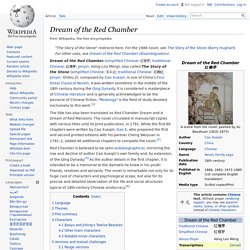
Journey to the West. Journey to the West has strong roots in Chinese folk religion, Chinese mythology, Taoist and Buddhist philosophy, and the pantheon of Taoist immortals and Buddhist bodhisattvas are still reflective of some Chinese religious attitudes today.
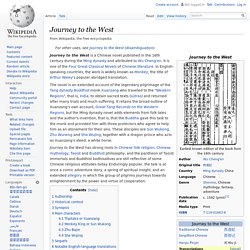
Enduringly popular, the tale is at once a comic adventure story, a spring of spiritual insight, and an extended allegory in which the group of pilgrims journeys towards enlightenment by the power and virtue of cooperation. Authorship[edit] Journey to the West was thought to have been written and published anonymously by Wu Cheng'en in the 16th century.[2] Hu Shih, literary scholar and then Ambassador to the United States, wrote that the people of Wu's hometown attributed it early on to Wu, and kept records to that effect as early as 1625; thus, claimed Ambassador Hu, Journey to the West was one of the earliest Chinese novels for which the authorship is officially documented.[2] Recent scholarship casts doubts on this attribution.
Translator W.J.F. Water Margin. Water Margin (Shui Hu Zhuan, sometimes abbreviated to Shui Hu), also translated as Outlaws of the Marsh, Tale of the Marshes, All Men Are Brothers, Men of the Marshes, or The Marshes of Mount Liang, is a novel attributed to Shi Nai'an.
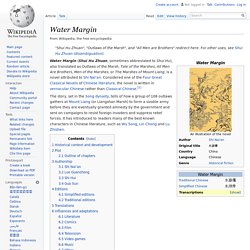
Considered one of the Four Great Classical Novels of Chinese literature, the novel is written in vernacular Chinese rather than Classical Chinese.[1] The story, set in the Song dynasty, tells of how a group of 108 outlaws gathers at Mount Liang (or Liangshan Marsh) to form a sizable army before they are eventually granted amnesty by the government and sent on campaigns to resist foreign invaders and suppress rebel forces. It has introduced to readers many of the best-known characters in Chinese literature, such as Wu Song, Lin Chong and Lu Zhishen. Historical context and development[edit] Romance of the Three Kingdoms. The story – part historical, part legend, and part mythical – romanticises and dramatises the lives of feudal lords and their retainers, who tried to replace the dwindling Han dynasty or restore it.
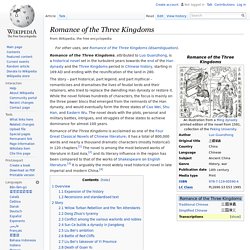
While the novel follows hundreds of characters, the focus is mainly on the three power blocs that emerged from the remnants of the Han dynasty, and would eventually form the three states of Cao Wei, Shu Han, and Eastern Wu. The novel deals with the plots, personal and military battles, intrigues, and struggles of these states to achieve dominance for almost 100 years. Overview[edit] Yama-uba. Yamauba (山姥 or 山うば?)
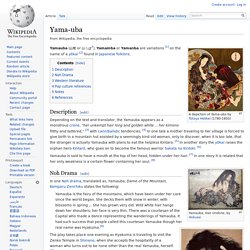
, Yamamba or Yamanba are variations [1] on the name of a yōkai [2] found in Japanese folklore. Tariqa. A tariqa (or tariqah; Arabic: طريقة ṭarīqah) is the term for a school or order of Sufism, or especially for the mystical teaching and spiritual practices of such an order with the aim of seeking ḥaqīqah "ultimate truth".
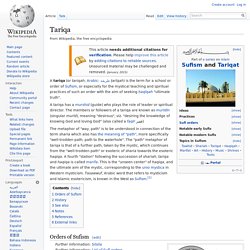
A tariqa has a murshid (guide) who plays the role of leader or spiritual director. The members or followers of a tariqa are known as murīdīn (singular murīd), meaning "desirous", viz. "desiring the knowledge of knowing God and loving God" (also called a faqīr فقير) Bektashi Order. Dervish order with Balkan origins.
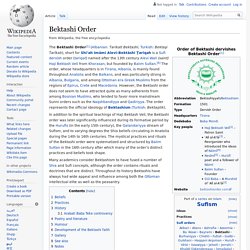
Drake Passage. Tourist expedition ship Akademik Ioffe sailing across the Drake Passage to Antarctica Depth profile with salinity and temperature for surface water.
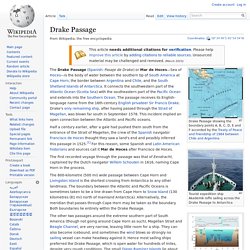
The Drake Passage (Spanish: Pasaje de Drake) or Mar de Hoces—Sea of Hoces—is the body of water between the southern tip of South America at Cape Horn, the border between Argentina and Chile, and the South Shetland Islands of Antarctica. It connects the southwestern part of the Atlantic Ocean (Scotia Sea) with the southeastern part of the Pacific Ocean and extends into the Southern Ocean. The passage receives its English-language name from the 16th-century English privateer Sir Francis Drake.
Drake's only remaining ship, after having passed through the Strait of Magellan, was blown far south in September 1578. Du Fu. Du Fu (Wade–Giles: Tu Fu; Chinese: 杜甫; pinyin: Dù Fǔ; 712 – 770) was a prominent Chinese poet of the Tang dynasty.
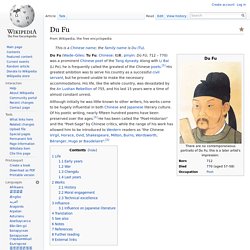
Along with Li Bai (Li Po), he is frequently called the greatest of the Chinese poets.[1] His greatest ambition was to serve his country as a successful civil servant, but he proved unable to make the necessary accommodations. His life, like the whole country, was devastated by the An Lushan Rebellion of 755, and his last 15 years were a time of almost constant unrest. Although initially he was little-known to other writers, his works came to be hugely influential in both Chinese and Japanese literary culture. Greenwich Village. Greenwich Village,[note 1] often referred to by locals as simply "the Village", is a neighborhood on the west side of Lower Manhattan, New York City.
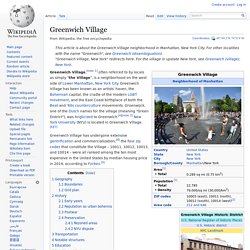
Greenwich Village has been known as an artists' haven, the Bohemian capital, the cradle of the modern LGBT movement, and the East Coast birthplace of both the Beat and '60s counterculture movements. Groenwijck, one of the Dutch names for the village (meaning "Green District"), was Anglicized to Greenwich.[4][note 2] New York University (NYU) is located in Greenwich Village.[6][7] Greenwich Village has undergone extensive gentrification and commercialization;[8] the four zip codes that constitute the Village – 10011, 10012, 10013, and 10014 – were all ranked among the ten most expensive in the United States by median housing price in 2014, according to Forbes.[9] Geography[edit] Cafe au Go Go. The Cafe au Go Go was a Greenwich Village night club located in the basement of 152 Bleecker Street. The club featured many well known musical groups, folksingers and comedy acts between the opening in February 1964 until closing in October 1969.
The club was originally owned by Howard Solomon who sold it in June 1969 to Moses Baruch. Baruch closed the club in October 1969. Howard Solomon became the manager of singer Fred Neil.[1] Legal problems[edit] Jean-Christophe Novelli. Jean-Christophe Novelli ([ʒɑ̃ kʁis.tɔf nɔ.vɛ.li]; born 22 February 1961) is a French celebrity chef. Early Life[edit] Novelli was born in Arras, in the Pas-de-Calais department in northern France, in 1961. John Vanbrugh. Sir John Vanbrugh (/ˈvænbrə/; 24 January 1664 (baptised) – 26 March 1726) was an English architect and dramatist, perhaps best known as the designer of Blenheim Palace and Castle Howard.[3] He wrote two argumentative and outspoken Restoration comedies, The Relapse (1696) and The Provoked Wife (1697), which have become enduring stage favourites but originally occasioned much controversy.
He was knighted in 1714.[4] Vanbrugh was in many senses a radical throughout his life. As a young man and a committed Whig, he was part of the scheme to overthrow James II, put William III on the throne and protect English parliamentary democracy, and he was imprisoned by the French as a political prisoner. In his career as a playwright, he offended many sections of Restoration and 18th century society, not only by the sexual explicitness of his plays, but also by their messages in defence of women's rights in marriage.
Cape Verde. Cape Verde i/ˌkeɪp ˈvɜrd/ (Portuguese: Cabo Verde, pronounced: [ˈkabu ˈveɾdɨ]), officially the Republic of Cabo Verde,[4] is an island country spanning an archipelago of 10 volcanic islands in the central Atlantic Ocean. Located 570 kilometres (350 miles) off the coast of Western Africa, the islands cover a combined area of slightly over 4,000 square kilometres (1,500 sq mi). Three (Sal, Boa Vista and Maio) are fairly flat, sandy and dry; the others generally rockier with more vegetation. Katie Price. "Jordan (model)" redirects here. Merlin. Ronaldinho. "Ronaldinho", the diminutive and term of endearment for "Ronaldo", is accompanied in Brazilian usage by the nickname "Gaúcho" (since he hails from southern Brazil), in order to distinguish him from fellow footballer and countryman Ronaldo, who was known as "Ronaldinho" in Brazil beforehand.
Ronaldo simply went by his first name upon his move to Europe, thereby allowing Ronaldinho to drop the "Gaúcho" and go by the name Ronaldinho abroad. Kaká. Ricardo Izecson dos Santos Leite (Portuguese pronunciation: [ʁiˈkaɾdu iˈzɛksõw duˈsɐ̃tus ˈlejt͡ʃi]; born 22 April 1982), commonly known as Kaká (Portuguese: [kaˈka] ( Ronaldo. In this name, the family name is Nazário de Lima, not Lima. Cristiano Ronaldo. Not to be confused with Brazilian footballer Ronaldo. Norman Foster, Baron Foster of Thames Bank. Norman Robert Foster, Lord Foster of Thames Bank, OM (born 1 June 1935) is an English architect whose company, Foster + Partners, maintains an international design practice famous for high-tech architecture. Rankings of universities in the United Kingdom. Richard Farleigh. Early life[edit] Born Richard Buckland Smith in Kyabram, Victoria, Australia.
Pandora. According to the myth, Pandora opened a jar (pithos), in modern accounts sometimes mistranslated as "Pandora's box" (see below), releasing all the evils of humanity—although the particular evils, aside from plagues and diseases, are not specified in detail by Hesiod—leaving only Hope inside once she had closed it again.[6] Prometheus. John Nash. Montagu House. Enterprise european network. Peerage of Great Britain. GIC Private Limited. Secondary mortgage market. Fannie Mae. Freddie Mac. Hyperion. 100 Greatest Britons. List of Australian Victoria Cross recipients. Red Ball Express. Kering. Stone Age. Hyman G. Rickover. House Un-American Activities Committee.
Laureate International Universities. Nazi concentration camps. British Army during the Victorian Era. Kerak Castle. Krak des Chevaliers. Campaign for Nuclear Disarmament. Seaton Delaval Hall. Evan Nepean. An Enemy of the People. Charles Lindbergh. Jimmy Doolittle. Boeing B-29 Superfortress. The Great Exhibition. Kibbutz. Pope Gregory VII. Jahannam. Umayyad Caliphate. Pasteur Institute. Leo Frank. Mary Pickford. Achaemenid Empire. University of Tehran. Negev Bedouin. Anglo-Soviet invasion of Iran. San Marino. Faroe Islands. Bucharest. Gothenburg. Copenhagen. Stockholm. Sweden. Malmö. Back home (1997. Battle of Grunwald. Three ancestral treasures.
Norway. Rama. Nāga. Shiva. Genghis Khan. Mongolia. Bucharest. Nephilim. Grace Jones. Lorenzo di Credi. Giovanni Bellini. Gilgamesh flood myth. Deluge. Karl Rove. Wolfgang Amadeus Mozart. Alfred the Great. Friedrich Schiller. Bowery. Mary Kostakidis. Karla Grant. Julian Hamilton. Janice Petersen. Lee Lin Chin.